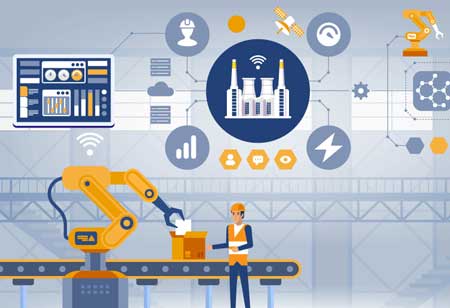THANK YOU FOR SUBSCRIBING
IIoT's Significance in a Smart Factory
IIoT will turn linear production supply chains into integrated Digital Supply Networks (DSNs), make factories more productive, save costs, and reduce human operators' risk.

By
Apac CIOOutlook | Tuesday, December 28, 2021
Stay ahead of the industry with exclusive feature stories on the top companies, expert insights and the latest news delivered straight to your inbox. Subscribe today.
IIoT will turn linear production supply chains into integrated Digital Supply Networks (DSNs), make factories more productive, save costs, and reduce human operators' risk.
FREMONT, CA: In the industrial sector, the growth of Industry 4.0 is emerging at a fast rate, and technical developments are the cornerstone of this evolution. Main innovations such as artificial intelligence, machine learning, robotics and the Automation and Industrial Internet of Things (IIoT) are critical. Smart Factories is a modern opportunity to introduce exciting technologies in the sense of linked and agile manufacturing to meet challenging output objectives.
Smart Factory
Smart Factories depends heavily on smart manufacturing, uses data, which is a highly digitized and linked production center. They are planned to accelerate modern manufacturing processes and increase efficiency, distribution, and decreased labor and energy output.
• Adopting robotics at a broader stage, such as drones, to replace existing human workloads.
See Also: Top Manufacturing Tech Solution Companies
• Using machine learning to evaluate data generated by sensors and tracking systems makes real-time decisions to increase output quality.
• Using IIoT to build a system of linked devices with predictive capabilities to make autonomous decisions based on an intelligent decision-making environment.
IIoT
IoT focuses even more on networking, data mining, and automation as part of a large digital ecosystem. The sensors are connected to physical assets in IIoT technology. These sensors capture data, store it wirelessly, and use analytics and machine learning to decide.
IIoT will turn linear production supply chains into integrated Digital Supply Networks (DSNs), make factories more productive, save costs, and reduce human operators' risk. The most prominent aspect of IIoT systems is the use of sensors to detect, for example, when a computer goes down or hits a too high temperature, the sensors then trace the cause of the problem and activate a service call. This aspect is regarded as 'Predictive Manufacturing,' a fascinating method that transforms data into information and makes an intelligent computer or process decisions.





